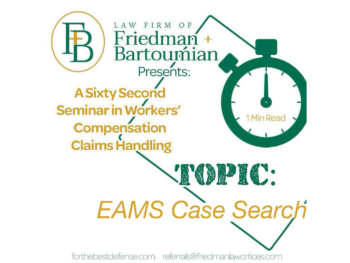We are substantially certain that our readers will not be surprised to learn that certain applicant attorneys are known for issuing a dozen or more document production subpoenas in every case they handle.
The subpoenas almost always include one which seeks the applicant’s personnel file. These attorneys can’t wait to read what the employer has to say about the industrial accident. For this reason, today’s blog offers recommendations so that privileged documents are not accidentally served when employment records are subpoenaed.
First, every subpoena must contain an ADJ number assigned by the WCAB. If an ADJ number is not listed on a subpoena, then it is invalid and need not be acted upon. An ADJ number is necessary to invoke both the jurisdiction and discovery power of the Workers’ Compensation Appeals Board, and monetary sanctions can be levied against those AA’s who attempt to circumvent the DWC’s discovery rules. The WCAB responds strongly against anyone caught violating discovery protocols. It’s actually a bit humorous when an employer is threatened by an applicant attorney for not responding to a defective subpoena. Should the matter proceed to a hearing, the applicant attorney would most likely be sanctioned by the judge for conducting inappropriate discovery.
Another adverse issue often encountered by employers concerns overly broad subpoenas. For example, a subpoena may call for the production of all payroll and attendance records for an injured employee without specifying a the time frame for those records. By way of example, if a longtime, 27-year employee is injured and their attorney subpoenas the production of all payroll and attendance records over the entire length of employment, one must ask, “Why does applicant’s attorney want copies of all payroll records dating back to the date of hire in 1998?” Such a request arguably would result in the production of irrelevant records, at a great burden to the employer.
Where a subpoena is overly broad the employer may seek relief from that abuse via a Petition to Quash filed at the WCAB requesting that the subpoena be limited, or that the expenses of the production be paid by the AA. Subpoenas that seek all records without identifying a time frame are at best the result of an AA being careless with their discovery requests and should not be tolerated, especially if multiple requests are received from the same law office in other files. To remedy this situation one Fortune 500 Company entered a WCJ approved agreement with an AA identifying terms and conditions which would govern the company’s compliance with subpoenas issued by the AA to that company in the future. The foregoing approach substantially reduced frictional costs to both the employer, the AA, and the Court.
Our last item today concerns the Employers First Report of Industrial Injury. This report, along with an addendum accident investigation, are privileged documents and need not be produced, even if a subpoena is issued. Not only does Labor Code § 6412 classify this report as a privileged document, but if accidentally produced, the code prohibits it from being introduced into evidence. In other words, the AA can’t use it!
We at Friedman + Bartoumian are hopeful that our blogging provides a valuable resource to our friends and clients! We welcome your input!


 Education Certificates: A 60-Second Seminar in Workers’ Compensation Claims Handling
Education Certificates: A 60-Second Seminar in Workers’ Compensation Claims Handling
Leave a Reply